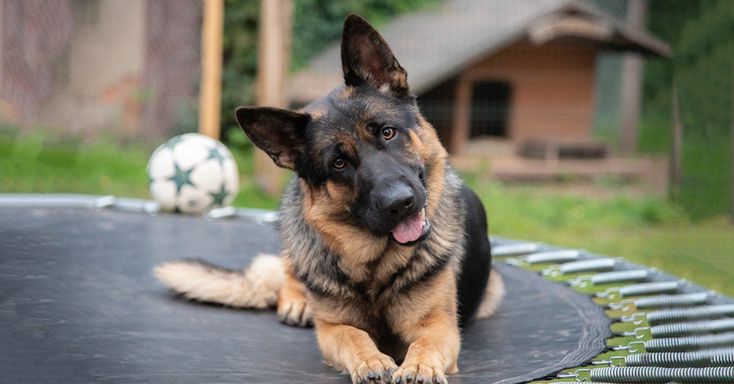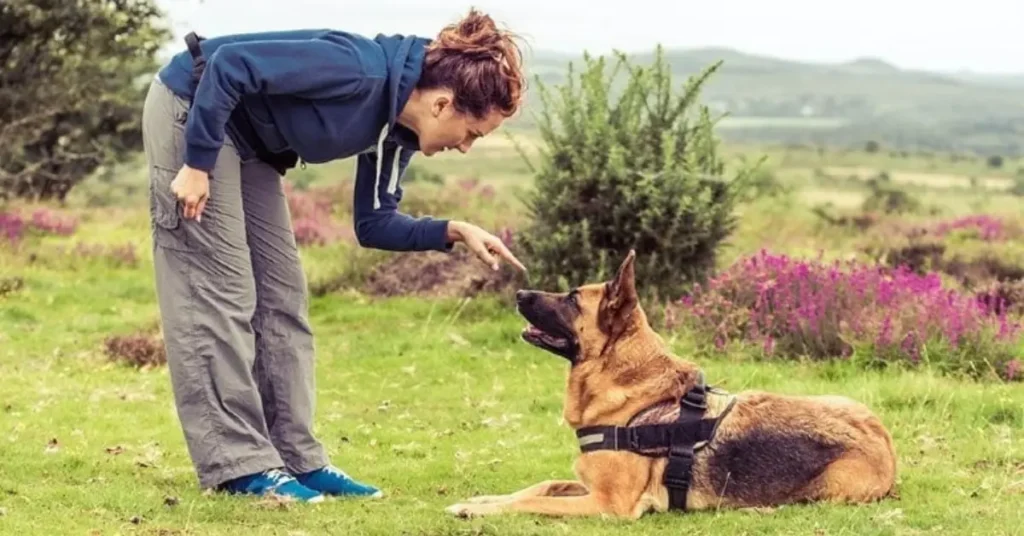German Shepherds, known for their intelligence and loyalty, are wonderful canine companions. However, like all dogs, they have their unique ways of communicating, and one of these is whining. If you’re a proud owner of a German Shepherd, you’ve likely encountered this behavior. In this article, we’ll explore the common reasons why German Shepherds whine and provide insights into how to address these issues effectively.

1. Communication: Expressing Needs and Desires
Whining is a fundamental form of communication for dogs, including German Shepherds. They may whine to express their basic needs, such as hunger, thirst, or the need to relieve themselves. Pay attention to their whining cues, as responding promptly to their needs can foster a strong bond between you and your furry friend.
2. Attention-Seeking Behavior
German Shepherds are affectionate and crave attention from their owners. They may whine to seek your company, whether it’s for playtime, petting, or just to alleviate loneliness. To address this, ensure you dedicate quality time to engaging with your dog daily. Regular exercise and interactive play can also help curb attention-seeking whining.
3. Managing Anxiety and Stress
These intelligent dogs are susceptible to anxiety and stress, often triggered by factors like separation anxiety, fear, or unfamiliar surroundings. Whining may be their way of expressing distress. Create a safe and comforting environment for your German Shepherd, consider training to reduce separation anxiety, and consult a professional if needed.
4. Indicating Pain or Discomfort
Dogs can’t verbally tell us when they’re in pain, so they rely on non-verbal cues like whining. If your German Shepherd whines persistently, especially when touched or during specific activities, it could indicate pain or discomfort. Consult your veterinarian to rule out underlying medical issues or injuries.
5. Combating Boredom
Like all dogs, German Shepherds need mental and physical stimulation. Whining can be a sign of boredom, signaling their desire for activities to engage in. Ensure they have stimulating toys, provide opportunities for exercise and mental challenges, and rotate their playtime to keep them mentally sharp and content.
6. Excitement and Anticipation
Sometimes, your German Shepherd’s whining is simply a display of excitement. This often occurs during playtime or when they’re anticipating something enjoyable, like a walk or mealtime. While this whining is generally harmless, it’s essential to maintain a consistent routine to manage their excitement effectively.
7. Dealing with Territorial Behavior
Whining can also be linked to territorial instincts. If your German Shepherd senses unfamiliar people or animals nearby, they may whine as a response. Proper socialization and training can help manage territorial behavior and reduce excessive whining in such situations.
8. Addressing Hunger
When a German Shepherd is hungry, they may use whining to signal their desire for food. Stick to a regular feeding schedule and provide a balanced diet to meet their nutritional needs, which can help reduce whining related to hunger.
9. Coping with Aging and Cognitive Changes
As German Shepherds age, cognitive decline may affect their behavior, including increased whining. Be patient and understanding with your older companion, and consult your veterinarian for guidance on managing age-related changes.
10. Recognizing Medical Issues
Persistent or sudden changes in whining patterns may indicate underlying medical issues, such as infections or organ problems. Always consult your veterinarian if you suspect your German Shepherd’s whining is related to a medical concern.
Symptoms of Whining
Symptoms associated with a dog’s whining can vary depending on the underlying cause of the whining. Here are some common symptoms and accompanying behaviors that may be observed when a dog is whining:
- Restlessness
- Excessive Vocalization
- Pawing or Scratching
- Pacing
- Excessive Licking or Chewing
- Changes in Body Language
- Inability to Settle
- Increased Alertness
- Loss of Appetite
- Lethargy
What to Do About Your Dog’s Whining?
To address your dog’s whining, start by identifying the underlying cause, whether it’s hunger, anxiety, or boredom. Once you understand the reason, take appropriate action, such as feeding them, providing companionship or mental stimulation, or seeking professional help for behavioral issues. Consistency and patience in addressing the root cause can help reduce excessive whining in your dog.
Here are some solutions when your dog is Whining
Give Your Dog Training and Exercising

Controlling your dog’s whining through training and exercise is a multi-faceted approach that combines physical and mental stimulation with consistent training techniques. This holistic strategy not only addresses the symptoms of whining but also enhances your dog’s overall well-being.
First and foremost, regular exercise is key. Dogs, including German Shepherds, have abundant energy and need an outlet to channel it. A tired dog is less likely to whine out of boredom or excess energy. Daily walks, playtime, and activities like fetch or agility training can help drain their energy reserves and keep them content.
Incorporate mental stimulation into their routine as well. Puzzle toys, interactive feeders, and obedience training sessions challenge their minds and prevent boredom, which is often a trigger for whining. These activities not only tire them out mentally but also reinforce positive behaviors.
When it comes to training, consistency is paramount. Teach commands like “quiet” or “enough” to help control whining. Use positive reinforcement techniques, rewarding your dog when it stops whining on command. Avoid scolding or punishment, as this can exacerbate anxiety or fear-based whining.
Identify the specific triggers for your dog’s whining. Is it separation anxiety, fear, or attention-seeking behavior? Tailor you’re training to address these root causes. For example, if separation anxiety is the issue, gradually desensitize your dog to departures and arrivals to reduce their anxiety.
Create a designated quiet space for your dog, such as a crate or a comfortable corner in a room. This space can serve as a retreat where they feel secure and can go to relax when they’re not whining. Make it inviting with cozy bedding and toys.
Consistency extends to your response as well. Be patient and avoid giving in to their demands when they whine. Only provide attention, food, or playtime when they are quiet. This teaches them that whining doesn’t yield the desired results.
If your dog’s whining persists despite your efforts, consider consulting a professional dog trainer or behaviorist. They can assess the situation and provide tailored guidance to address the underlying issues causing the whining.
Be Attentive to Your Dog
Being attentive to your dog is a crucial element in controlling their whining behavior. Dogs, including German Shepherds, often whine as a means of communication, and by paying close attention to their needs and cues, you can effectively address the underlying causes of their whining.
First and foremost, it’s essential to establish a strong bond with your dog through regular interaction, exercise, and positive reinforcement. When your dog feels loved and secure, they are less likely to whine for attention or out of anxiety.
Consistency in your response is vital. When your dog whines for attention, avoid reinforcing the behavior by scolding or rewarding them. Instead, wait for a moment of quiet and calm before providing attention or affection. This teaches them that whining doesn’t yield positive results.
Additionally, you can use positive reinforcement techniques to encourage quiet behavior. When your dog stops whining, reward them with treats, praise, or affection. Over time, they will associate being quiet with positive outcomes, reinforcing this desirable behavior.
Training and mental stimulation are also effective tools in controlling whining. Engage your dog in obedience training to establish clear communication and boundaries. Providing them with toys, puzzles, or interactive games can keep their minds occupied and reduce boredom-related whining.
Provide Your GS with Distractions
Distractions can be an effective strategy to address this common canine behavior. These intelligent and active dogs thrive on mental and physical stimulation, and providing distractions can help redirect their focus and energy away from whining.
Firstly, consider interactive toys and puzzles designed to challenge your German Shepherd’s problem-solving skills. Toys like treat-dispensing balls or puzzle feeders can keep them engaged for extended periods, mentally stimulating them and reducing the urge to whine out of boredom.
Regular exercise is crucial for German Shepherds, and a tired dog is often a quieter dog. Engage in daily walks, play fetch, or explore other activities that allow your dog to burn off excess energy. This not only helps physically but also provides mental stimulation through exploration and interaction with their environment.
Training your German Shepherd is another effective way to control whining through distractions. Teach them commands like “quiet” or “leave it” to redirect their attention when they start whining. Positive reinforcement techniques, such as rewarding them with treats or praise when they obey these commands, can reinforce the desired behavior.
Engaging in interactive play sessions with your German Shepherd not only provides physical exercise but also strengthens your bond. Games like tug-of-war or hide-and-seek can be fun distractions that redirect their attention and energy in a positive way.
Show Your Dog to a Veterinary
While occasional whining is normal for dogs and can have various reasons as mentioned earlier, it’s essential to monitor your dog’s whining patterns. If you notice a sudden, persistent, or unusual change in their whining behavior, especially if it’s accompanied by other concerning symptoms like lethargy, loss of appetite, or signs of pain, it’s advisable to consult a veterinarian. Whining can sometimes be a sign of underlying medical issues, and a veterinary evaluation can help rule out any health problems and ensure your dog receives appropriate care and treatment if needed. Early detection and intervention can be crucial in addressing potential health issues and providing your dog with the best possible care.
Conclusion
Understanding why German Shepherds whine is essential for maintaining a harmonious relationship with these remarkable dogs. By addressing their needs, providing appropriate training, and seeking professional guidance, when necessary, you can ensure a happy and healthy life for your loyal German Shepherd.
FAQs
What does it mean when a German Shepherd whines?
When your German Shepherd starts to whine, it could be their way of seeking your attention. German Shepherds are known for their intelligence and lively nature. To keep them content, they require ample exercise and mental challenges. If your German Shepherd feels bored or lacks stimulation, they might resort to whining as a means to express their frustration and seek engagement.
How can I get my German Shepherd to stop whining?
When your German Shepherd begins to whine, it’s crucial to avoid comforting them. Dogs may see comfort as a reward for unwanted behavior. Instead, refrain from acknowledging the whining and withhold any verbal or physical attention until the behavior ceases.
Is my dog sad when he whines?
It’s common for dogs to experience feelings of anxiety, fear, or stress. When puppies are introduced to new environments, such as being in a crate or at night, they may express their discomfort through whining. This transition can be particularly challenging for them, especially after leaving their litter. Whining often signals underlying issues like separation anxiety or sensitivity to loud noises such as fireworks.

